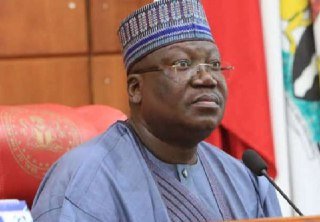Senate President Ahmad Lawan says the national assembly is working to ensure that all Nigerians abroad can vote.
Lawan spoke on Wednesday when received Abike Dabiri-Erewa, chief executive officer (CEO) of NiDCOM, at his office in Abuja.
The senate president said the assembly is also working to ensure that the country’s electoral process is transparent and has integrity.
“I believe that at one point, I don’t know when and how far it will take us before we could start diaspora voting,” he said.

“I can assure you that the national assembly is doing everything, particularly this ninth national assembly is doing everything possible to ensure that our electoral processes and procedures are fully supported to make them have more transparency and integrity, and that is what we want to achieve at home.
“We are simultaneously working to ensure that Nigerians outside of Nigerians are able to vote and have their votes count.
“It is very important we get the electoral process right. We have passed the electoral act (amendment bill), we are now at the verge of having a harmonisation of the two versions of what passed in the senate and the house of representatives.
“Diaspora voting is a wish for all of us, and when we reach there, we must ensure that every part of our diaspora community in every part of the world is given the opportunity to participate.”
On his part, Ovie Omo-Agege, deputy senate president and chairman of the committee on the amendment of 1999 constitution, said the Independent National Electoral Commission (INEC) has been asked to put in place a proper framework that will enable Nigerians abroad to vote.
“We thought the best way around it at this time is to liaise with INEC to come up with a proper framework for us to include in the exercise and I have the privilege to share that with the Chairman of NiDCOM,” Omo-Agege said.
Also speaking, Dabiri-Erewa said she was at the office of the senate president to present him with a publication of Nigerians who are doing well abroad.
“We know that we have negative stories about our brothers and sisters in the Diaspora but we have more positive than negative (stories),” she said.


